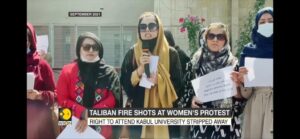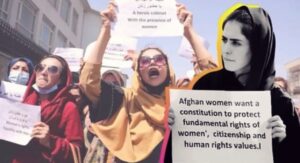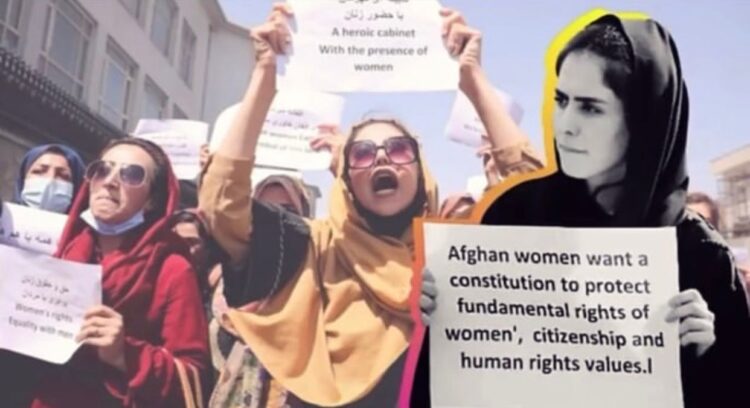Wir freuen uns, im Dezember im Rahmen der vom AStA der Universität Bonn geförderten Reihe “Gesellschaft macht Geschlecht” am Montag, 5. Dezember, um 19 Uhr im Hörsaal 17 der Universität Bonn (Kunsthistorisches Institut, Zugange neben dem Koblenzer Tor) mit Samira Khairkhwah eine der bekanntesten Frauenrechtlerinnen Afghanistans begrüßen zu dürfen, die zu dem Kreis der Menschen zählte, deren Flucht vor den Taliban wir gemeinsam mit anderen im vergangenen Jahr unterstützten. Samira Khairkhwah wird über den Widerstand afghanischer Frauen nach der erneuten Machtergreifung der Taliban und ihre eigenen Erfahrungen als Kämpferin für Frauen- und Menschenrechte sprechen.
Der Vortrag findet in englischer Sprache statt; für die anschließende Frage und Diskussionsrunde wird es eine Übersetzung Deutsch/ Englisch/Dari geben.
„For the past 20 years, we have been studying and trying to achieve our goals. But today, unfortunately, all the Afghan women’s dreams have been destroyed.
Now that the Taliban control the country, even raising the Afghan national flag has become an act of resistance.
Now that the Taliban control the country, even raising the Afghan national flag has become an act of resistance.

Many women are waiting to raise their voices, but they are still afraid that they will not be able to leave their homes.
I raise the voice of millions of Afghan women, because a woman can be just as brave as a man, has the right to study, to work, and maintain a meaningful presence in the development of the country.“
I raise the voice of millions of Afghan women, because a woman can be just as brave as a man, has the right to study, to work, and maintain a meaningful presence in the development of the country.“
Samira Khairkhwah is one of the first women to publicly raise her voice
against the new Taliban regime as she coordinated the first women rights protest in Kabul by setting up messenger groups for women and preparing papers and leaflets in Farsi as well as in English. Following this, the Taliban openly requested her her to immediately seize all activities or be murdered as they had identified her as leader of the Kabul women’s rights protests against their regime. Being urged by her family that was fearing for her life, she ultimately left the country. She continues to keep engaged in the Afghan women’s rights struggle as she has been giving interviews on the situation of women and girls in Afghanistan. She also stays in close touch with spontaneous movements of women right’s fighters in Afghanistan as she vows solidarity with every girl whose life and freedom is in danger.
Further, she has been a nominee as Independent Candidate for Afghanistan Parliament from Mazar province in 2014 and has worked as a journalist and civil activist under serious threats from Taliban and other terrorist groups, as her face is very well-known from various national media coverage.
Her employment as a journalist in the Setar-e-Sahar Radio and TV, her engagement as a civil activist, her political work (as the aforementioned nomination as parliamentary candidate and being a Spokesperson in the Presidential Campaign 2019) had already caused severe strain on herself as well as her family.
When the Taliban gained a stronger foothold in Afghanistan last year, threats via phone and other means kept increasing. This included being stopped in the streets on several occasions and by various individuals, demanding that she stop her work, given she is an Afghan woman. Under threats of violence and murder, she had been told that it would be a shame for an Afghan girl to be a leader. Hence, she had to cease all activities and stay inside.
As she she saw no further chance to keep living in Mazar-e-Sharif, she fled to Kabul in hopes of a safe heaven. However, she continuous had to keep changing her residence in efforts to secure her safety from the various terrorist groups.
Her employment as a journalist in the Setar-e-Sahar Radio and TV, her engagement as a civil activist, her political work (as the aforementioned nomination as parliamentary candidate and being a Spokesperson in the Presidential Campaign 2019) had already caused severe strain on herself as well as her family.
When the Taliban gained a stronger foothold in Afghanistan last year, threats via phone and other means kept increasing. This included being stopped in the streets on several occasions and by various individuals, demanding that she stop her work, given she is an Afghan woman. Under threats of violence and murder, she had been told that it would be a shame for an Afghan girl to be a leader. Hence, she had to cease all activities and stay inside.
As she she saw no further chance to keep living in Mazar-e-Sharif, she fled to Kabul in hopes of a safe heaven. However, she continuous had to keep changing her residence in efforts to secure her safety from the various terrorist groups.

Samira Khairkhwah soon realized that because of her broad media presence, including having conducted interviews with most TV stations in Afghanistan, her face being displayed on numerous photos and banners in Mazar-e-Sharif during her nomination as a candidate for Parliament and a lot of online accessible pictures and videos of her activism, terrorist groups had too many clear images of her, which put her life at immediate risk.
Ultimately, this led her to flee the country a while after the Taliban seized power in Kabul, for which she was also seeking support by the German government.




